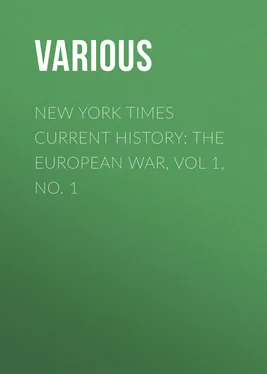Various - New York Times Current History - The European War, Vol 1, No. 1
Здесь есть возможность читать онлайн «Various - New York Times Current History - The European War, Vol 1, No. 1» — ознакомительный отрывок электронной книги совершенно бесплатно, а после прочтения отрывка купить полную версию. В некоторых случаях можно слушать аудио, скачать через торрент в формате fb2 и присутствует краткое содержание. Жанр: foreign_edu, periodic, История, на английском языке. Описание произведения, (предисловие) а так же отзывы посетителей доступны на портале библиотеки ЛибКат.
- Название:New York Times Current History: The European War, Vol 1, No. 1
- Автор:
- Жанр:
- Год:неизвестен
- ISBN:нет данных
- Рейтинг книги:4 / 5. Голосов: 1
-
Избранное:Добавить в избранное
- Отзывы:
-
Ваша оценка:
- 80
- 1
- 2
- 3
- 4
- 5
New York Times Current History: The European War, Vol 1, No. 1: краткое содержание, описание и аннотация
Предлагаем к чтению аннотацию, описание, краткое содержание или предисловие (зависит от того, что написал сам автор книги «New York Times Current History: The European War, Vol 1, No. 1»). Если вы не нашли необходимую информацию о книге — напишите в комментариях, мы постараемся отыскать её.
New York Times Current History: The European War, Vol 1, No. 1 — читать онлайн ознакомительный отрывок
Ниже представлен текст книги, разбитый по страницам. Система сохранения места последней прочитанной страницы, позволяет с удобством читать онлайн бесплатно книгу «New York Times Current History: The European War, Vol 1, No. 1», без необходимости каждый раз заново искать на чём Вы остановились. Поставьте закладку, и сможете в любой момент перейти на страницу, на которой закончили чтение.
Интервал:
Закладка:
Our Own True Position.
Now comes the question, in what position did this result of a mad theory and a hopelessly incompetent application of it on the part of Potsdam place our own Government? It left us quite clearly in the position of the responsible policeman of the west. There was nobody else in Europe strong enough to chain "the mad dog." Belgium and Holland, Norway and Sweden, Denmark and Switzerland could hardly have been expected to take that duty on themselves, even if Norway and Sweden had not good reason to be anti-Russian, and the Dutch capitalists were not half convinced that their commercial prosperity would be greater under German than under native rule. It will not be contended that Spain could have done anything; and as to Italy, it was doubtful whether she did not consider herself still a member of the Triple Alliance. It was evidently England or nobody. For England to have refrained, from hurling herself into the fray, horse, foot, and artillery, was impossible from every point of view. From the democratic point of view it would have meant an acceptance of the pretension of which Potsdam, by attacking the French Republic, had made itself the champion: that is, the pretension of the Junker class to dispose of the world on Militarist lines at the expense of the lives and limbs of the masses. From the international Socialist point of view, it would have been the acceptance of the extreme nationalist view that the people of other countries are foreigners, and that it does not concern us if they choose to cut one another's throats. Our Militarist Junkers cried "If we let Germany conquer France it will be our turn next." Our romantic Junkers added "and serve us right too: what man will pity us when the hour strikes for us, if we skulk now?" Even the wise, who loathe war, and regard it as such a dishonour and disgrace in itself that all its laurels cannot hide its brand of Cain, had to admit that police duty is necessary and that war must be made on such war as the Germans had made by attacking France in an avowed attempt to substitute a hegemony of cannon for the comity of nations. There was no alternative. Had the Foreign Office been the International Socialist Bureau, had Sir Edward Grey been Jaures, had Mr. Ramsay MacDonald been Prime Minister, had Russia been Germany's ally instead of ours, the result would still have been the same: we must have drawn the sword to save France and smash Potsdam as we smashed and always must smash Philip, Louis, Napoleon, et hoc genus omne .
The case for our action is thus as complete as any casus belli is ever likely to be. In fact its double character as both a democratic and military (if not Militarist) case makes it too complete; for it enables our Junkers to claim it entirely for themselves, and to fake it with pseudo-legal justifications which destroy nine-tenths of our credit, the military and legal cases being hardly a tenth of the whole: indeed, they would not by themselves justify the slaughter of a single Pomeranian grenadier. For instance, take the Militarist view that we must fight Potsdam because if the Kaiser is victorious, it will be our turn next! Well: are we not prepared to fight always when our turn comes? Why should not we also depend on our navy, on the extreme improbability of Germany, however triumphant, making two such terrible calls on her people in the same generation as a war involves, on the sympathy of the defeated, and on the support of American and European public opinion when our turn comes, if there is nothing at stake now but the difference between defeat and victory in an otherwise indifferent military campaign? If the welfare of the world does not suffer any more by an English than by a German defeat who cares whether we are defeated or not? As mere competitors in a race of armaments and an Olympic game conducted with ball cartridge, or as plaintiffs in a technical case of international law (already decided against us in 1870, by the way, when Gladstone had to resort to a new treaty made ad hoc and lapsing at the end of the war) we might as well be beaten as not, for all the harm that will ensue to anyone but ourselves, or even to ourselves apart from our national vanity. It is as the special constables of European life that we are important, and can send our men to the trenches with the assurance that they are fighting in a worthy cause. In short, the Junker case is not worth twopence: the Democratic case, the Socialist case, the International case is worth all it threatens to cost.
The German Defence to Our Indictment.
What is the German reply to this case? Or rather, how would the Germans reply to it if their official Militarist and Kaiserist panjandrums had the wit to find the effective reply? Undoubtedly they would say that our Social-Democratic professions are all very fine, but that our conversion to them is suspiciously sudden and recent. They would remark that it is a little difficult for a nation in deadly peril to trust its existence to a foreign public opinion which has not only never been expressed by the people who really control England's foreign policy, but is flatly opposed to all their known views and prejudices. They would ask why, instead of making an Entente with France and Russia and refusing to give Germany any assurance concerning its object except that we would not pledge ourselves to remain neutral if the Franco-Russian Entente fell on Germany, we did not say straight out in 1912 (when they put the question flatly to us), and again last July when Sazonoff urged us so strongly to shew our hand, that if Germany attacked France we should fight her, Russia or no Russia (a far less irritating and provocative attitude), although we knew full well that an attack on France through Belgium would be part of the German program if the Russian peril became acute. They would point out that if our own Secretary for Foreign Affairs openly disclaimed any knowledge of the terms of the Franco-Russian alliance, it was hard for a German to believe that they were wholly fit for publication. In short, they would say "If you were so jolly wise and well intentioned before the event, why did not your Foreign Minister and your ambassadors in Berlin and Vienna and St. Petersburg—we beg pardon, Petrograd—invite us to keep the peace and rely on western public opinion instead of refusing us every pledge except the hostile one to co-operate with France against us in the North Sea, and making it only too plain to us that your policy was a Junker policy as much as ours, and that we had nothing to hope from your goodwill? What evidence had we that you were playing any other game than this Militarist chess of our own, which you now so piously renounce, but which none of you except a handful of Socialists whom you despise and Syndicalists whom you imprison on Militarist pretexts has opposed for years past, though it has been all over your Militarist anti-German platforms and papers and magazines? Are your Social-Democratic principles sincere, or are they only a dagger you keep up your sleeve to stab us in the back when our two most formidable foes are trying to garotte us? If so, where does your moral superiority come in, hypocrites that you are? If not, why, we repeat, did you not make them known to all the world, instead of making an ambush for us by your senseless silence?"
I see no reply to that except a frank confession that we did not know our own minds; that we came to a knowledge of them only when Germany's attack on France forced us to make them up at last; that though doubtless a chronic state of perfect lucidity and long prevision on our part would have been highly convenient, yet there is a good deal to be said for the policy of not fording a stream until you come to it; and that in any case we must entirely decline to admit that we are more likely than other people to do the wrong thing when circumstances at last oblige us to think and act. Also that the discussion is idle on the shewing of the German case itself; for whether the Germans assumed us to be unscrupulous Militarists or conscientious Democrats they were bound to come to the same conclusion: namely, that we should attack them if they attacked France; consequently their assumption that we would not interfere must have been based on the belief that we are simply "contemptible," which is the sort of mistake people have to pay for in this wicked world.
Читать дальшеИнтервал:
Закладка:
Похожие книги на «New York Times Current History: The European War, Vol 1, No. 1»
Представляем Вашему вниманию похожие книги на «New York Times Current History: The European War, Vol 1, No. 1» списком для выбора. Мы отобрали схожую по названию и смыслу литературу в надежде предоставить читателям больше вариантов отыскать новые, интересные, ещё непрочитанные произведения.
Обсуждение, отзывы о книге «New York Times Current History: The European War, Vol 1, No. 1» и просто собственные мнения читателей. Оставьте ваши комментарии, напишите, что Вы думаете о произведении, его смысле или главных героях. Укажите что конкретно понравилось, а что нет, и почему Вы так считаете.











